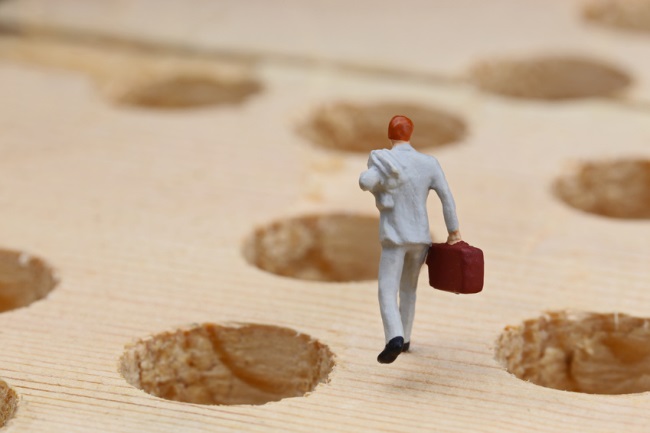“By The Side Of The Road”
December 19, 2011
“A man lived by the side of the road and sold hot dogs. He was hard of hearing so he had no radio. He had trouble with his eyes, so he had no newspapers. But, he sold good hot dogs. He put up a sign on the highway telling how good they were. He stood by the side of the road and cried, ‘Buy a hot dog mister.’ And, people bought. He increased his meat and bun order and he bought a bigger stove to take care of his trade. He got his son home from college to help him, but then something happened. His son said, ‘Father, haven’t you been listening to the radio? There’s a big depression on. The international situation is terrible and the domestic situation is even worse.’ Whereupon the father thought, ‘Well, my son has been to college. He listens to radio and reads the newspaper, so he ought to know.’ So, the father cut down his bun order, took down his advertising signs, and no longer bothered to stand on the highway to sell hot dogs. His hot dog sales fell almost overnight. ‘You were right son,’ the father said to the boy. ‘We are most certainly in the middle of a great depression.’ ”
... Author Unknown
For months I have stated, “While I guess we could talk ourselves into a recession, like the aforementioned hot dog folks, most of the finger-to-wallet ratios I monitor are not pointing towards a recession.” To be sure, railcar loadings (especially intermodal) have been pretty strong for the past few months. State tax receipts are up year-over-year. East Coast port traffic, both inbound and outbound, remains perky. And, one of the best walk around indicators, namely foot traffic at the casual dining restaurants because it is the most discretionary of all consumer purchases, is still positive if you strip out the recent company specific hiccup from Darden (DRI/$43.68/Outperform). Indeed, last week Knapp Track results for November were pre-released with industry comps slowing to +0.2% with traffic down 2.2%. However, Darden’s Olive Garden (OG) comprises ~10% of the Knapp Track Index. If you strip out the 5.7% decline in Olive Garden comps in November, the remaining 90% of the Knapp Track Index was better by some 0.85%, which is consistent with the +0.9% ex-OG Knapp result. Thus outside of OG, industry demand has slowed a touch from the +1-2% trend, but not as meaningfully as the headline number might suggest. While December is clearly the most important month of 4Q, the QTD comp of +0.5% is moderately below our 4Q estimates for most of our companies, which are +1-2%. Additionally, if we were heading into a recession high yield bonds would be tanking and that is just not happening. So I will say it again, “While I guess we could talk ourselves into a recession, most of the finger-to-wallet ratios I monitor are not pointing towards a recession.”
Another stock market worry is Euroquake. Years ago I read a book titled “Sails on the Horizon.” That book referenced the term “Hull Down.” According to Wikipedia, “Hull Down” describes the situation where the upper part of a vessel is visible, but the main part of the boat, namely the hull, is not. The term originated with sailing and naval warfare. Due to the convexity of the earth, a ship’s upper rigging will be visible at a much greater distance than its lower hull. It’s pretty weird to see a ship materialize over the horizon as it approaches. First the mast comes into view, then the bridge, and finally the hull appears. Said book came to mind recently in relation to the Greek Gotcha. In many U.S. Government reports we are seeing more and more references as to how the Euroquake situation might affect us. Such effects pertaining to the American economy are unknowable at this point in time. The potential could be that the “Hull Down” effect, with only the mast showing, may not be surfacing the entire “hull” as of yet. That said, having lived inside the D.C. Beltway I have a sense for politicians, bankers, and bureaucrats. Manifestly, they do not want to lose their power! Similarly, the ECB, the bureaucrats surrounding it, and the politicians don’t want to lose their power. If the European Union (EU) falls apart, they will all most certainly lose power. Hence, my hunch is they will find some way to buy more time on the hope that time will cure the current mess.
The real problem for the EU, however, is that you can’t have a unified currency without a unified fiscal policy. Because the EU didn’t have a unified fiscal policy, there has been a h-u-g-e misallocation of capital that has left the club-Med countries uncompetitive with other countries like Germany. Yet, as Dr. Sherry Cooper, writes:
“For the eurozone, the productivity differences among the 17-member countries are an even bigger problem and, as Ottawa has learned, you cannot legislate productivity. Germany is by far the most productive economy in Europe and the gap has widened with the restructuring of its labor markets over the past decade. Since 2000, unit labor costs in Germany have risen about 20%-40% less than in the other euro countries. That gap has left Germany with a large intra-European trade surplus while most other countries run deficits. Germany is an export juggernaut, not just with the eurozone, but with China and the rest of the world, which has spurred its economic growth and mitigated the rise in its debt and deficit ratios. German employment hit another post-unification high in October, highlighting the massive disconnect between its current prosperity and the suffering in many other eurozone members. This was no accident on Germany’s part. Berlin was well aware that, by adopting the euro, it was almost certain to benefit from a significantly undervalued currency. By abandoning the deutsche mark, Germany locked into fixed exchange rates with the likes of Greece, Portugal, Italy and others. This virtually guaranteed it would have a sustained competitive advantage vis-à-vis the rest of the world, without being accused of manipulating its currency (like China). And, while Germans complain loudly that the cost of supporting the rest of the eurozone is an unreasonable burden, you better believe that burden has been well worth it, or the Germans would have never supported the creation of the eurozone in the first place.”
Of course all of this is having an effect on our stock market; and that effect has been choppy, choppy, and choppy. For example, year-to-date there have been 50 one hundred point (or more) upside days and 48 one hundred point (or more) downside days. That’s a ratio of over 40% of the trading sessions for 2011; no wonder the investing public is freaked. Still, our markets have held up remarkably well given the EU situation. I think the reason for the resiliency is that the panic declines of August, and early October (the undercut low of October 4), created the most oversold stock market readings in years, making it difficult for stocks to cascade further. Moreover, the recent economic reports have had a decidedly better spin to them. Also of note is the U.S. dollar’s strength, which has left the Dollar Index up some 8% from its late-October low. The quid pro quo has been a rout in commodities as reflected in the CRB Commodity Index’s ~10% decline from its October high. Particularly hard hit has been gold as it has fallen nearly 19% from its recent all-time high. Yet, at least to me, gold remains in an uptrend; and while it has broken below its 200-day moving average (DMA), that 200-DMA is still upward sloping (read that bullishly). At times like these one should also remember that since the gold bull market began in 2002, gold has corrected every year by between 8% and 34%. As for stocks, while my long-standing pivot point of 1217 on the S&P 500 (SPX/1219.66) was violated last week, it was not violated decisively. However, if last Wednesday’s intraday low of 1209.47 is breached on a closing basis I would consider that to be “decisive” and consequently I will be forced to raise cash.
The call for this week: I think the SPX made its low last week at 1209.47. I also believe the Dollar Index made its high last week because I think Mr. Bernanke wants a lower U.S. dollar. If those thoughts prove correct, the CRB Commodity Index has likely made a double bottom in the charts and crude oil is headed higher. But remember, if Santa fails to call the bears will roam on Broad and Wall! Merry Christmas everyone ...
P.S. – We are traveling, so these will be the only strategy comments for the week ...












